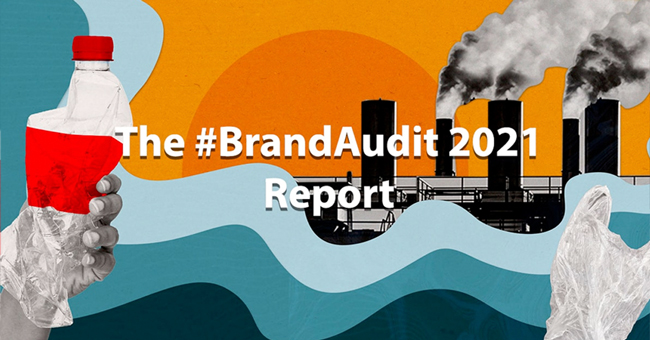Two of the world’s leading beverage companies — The Coca-Cola Company and PepsiCo — were named among the world’s top plastic polluters for the fourth year in a row, according to the latest global Brand Audit report from Break Free From Plastic (BFFP), released yesterday. The audit cites the beverage giants as top offenders for fueling the climate crisis and also names Unilever as the world’s third largest polluter.
“It’s not surprising to see the same big brands as the world’s top plastic polluters for four years in a row,” said Abigail Aguilar, Plastics Campaign Regional Coordinator for Greenpeace Southeast Asia, in a press release. “These companies claim to be addressing the plastic crisis, yet they continue to invest in false solutions while teaming up with oil companies to produce even more plastic. To stop this mess and combat climate change, multinationals like Coca-Cola, PepsiCo, and Unilever must end their addiction to single-use plastic packaging and move away from fossil fuels.”
The data from the report was generated from BFFP-led beach cleanups that took place in 45 countries around the world, with help from over 11,000 volunteers. Despite Coca-Cola’s pledge to collect one bottle for each sold, volunteers collected almost 20,000 Coca-Cola branded products this year — more than double the amount collected from PepsiCo and Unilever combined.
Earlier this week, Coca-Cola unveiled a prototype for a fully plant-based plastic bottle (excluding the cap and label) and cited its commitment to use 50% recycled material and ensure 100% of its packaging is recyclable by 2030 in the announcement. However, according to a recent report from CalRecycle, the company has not made substantial progress toward its goal to increase its use of recycled material.
PepsiCo ranked second on BFFP’s list, marking the third consecutive year that the corporation has found itself among the top three polluters. The report comes a month after the company announced its pep+ initiative that, among a range of sustainability commitments, states that the company has voluntarily committed to cutting the content of virgin plastic in its bottles in half by 2030, a goal it appears to be working towards considering 2020 data.
For Unilever, the parent company of brands such as Lipton, this year’s report signifies the first time it has risen to a top spot on the polluter’s list. This announcement comes at an awkward time, as the company is set to serve as a principal partner for the upcoming United Nations Climate Change summit, COP26, which has garnered increased skepticism from BFFP members.
“It is clear that we cannot rely on these companies to do the right thing,” said Neil Tangri, Science and Policy Director of GAIA, in a press release. “It’s time for governments to step up and enact policies to reduce waste and hold producers accountable. Current investments in expanded plastic production mean that plastic will take upwards of 13% of the 1.5°C carbon budget by 2050. If world leaders do not take bold action to reduce plastic production, there is no way that we will meet the 1.5°C target and avoid climate catastrophe.”
Alongside to this report, a recent study from Greenpeace unveiled that in addition to those named above, multiple leading CPG brands, including Nestlé, Mondelēz, Danone, Colgate Palmolive, Procter & Gamble and Mars, source packaging from manufacturers that are working directly with leading fossil fuel companies such as Exxon and Shell. These findings come only weeks after corporations such as Mars and Nestle announced their sustainability commitments which were largely focused on reducing emissions across their entire value chain.
The BFFP report emphasized the need for governmental action to hold companies accountable and initiate a real shift away from single-use plastic in a press release. BFFP’s brand audit is an annual citizen’s action initiative that began in 2018. This year, the cleanups collected a total of 330,493 pieces of plastic through 440 organized brand audits conducted by its volunteers around the world. BFFP’s goal is to reduce the prominence of single-use plastic across the entire value chain, from extraction to disposal.
